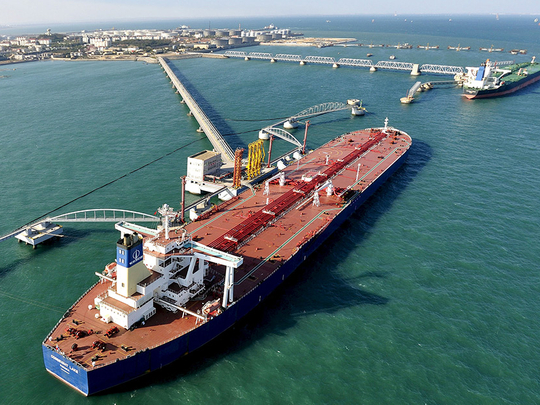
Vienna, Singapore: Oil is set for the longest run of monthly gains in five years as output disruptions from Nigeria to Canada reduce supply before the Organisation of Petroleum Exporting Countries (Opec) meets Thursday in Vienna to discuss production policy.
Futures were little changed in New York from the Friday close, set for a fourth monthly advance. Oil prices were mixed on Tuesday as investors awaited manufacturing data from China ahead of an Opec meeting on production caps.
Volumes were thin after Wall Street and London's financial markets were closed on Monday.
Militant attacks have cut Nigerian supply to the lowest level in more than two decades while Canadian output fell amid wildfires.
Producers are starting to resume operations after the blaze eased. Libya's Petroleum Facilities Guard captured a town near the Es Sider and Ras Lanuf oil-loading terminals after fierce clashes with Daesh militants.
Oil has surged more than 85 percent since slumping to a 12-year low in February on signs the worldwide surplus is easing amid declining production from the U.S. to Nigeria.
The Opec is unlikely to reach any agreement to limit output when it meets June 2 as the group sticks with Saudi Arabia's strategy of squeezing out rivals, according to analysts surveyed by Bloomberg.
"It's difficult to see Saudi giving much in terms of the supply situation and clearly Iran's not going to step back," Robert Rennie, the global head of currency and commodity strategy at Westpac Banking Corp. in Sydney, said in a Bloomberg Television interview.
"Beyond $50, I think crude starts to struggle. It looks like the Canadian production should start to pick up."
Libyan battle
Brent for July settlement, which expires Tuesday, lost 2 cents to $49.74 a barrel on the London-based ICE Futures Europe exchange after rising 0.9 percent Monday. Prices are set for a fourth monthly increase, also the longest streak since 2011.
The more-active August contract slipped 9 cents to $50.27. The global benchmark traded at a premium of 18 cents to WTI for July.
Libyan forces took control of the town of Bin Jawad after clashes during which five petroleum guards were killed and 16 others wounded, PFG spokesman Ali al-Hasy said by phone.
The nation is the smallest OPEC producer, pumping about 310,000 barrels a day.
China data
Dealers, meanwhile, expect Chinese manufacturing data due on Wednesday to set the tone at mid-week.
China is the world's largest energy consumer so any indication of how its economy is performing acts as a key driver for oil prices.
"If the number is positive, it should help in prices as China is one of the drivers for the commodity," CMC Markets trader Alex Wijaya told AFP.
"Major markets were closed Monday so there wasn't much of a driver for prices. Today should be pretty quiet as well."
At about 0330 GMT, US benchmark West Texas Intermediate (WTI), for delivery in July, was up 24 cents at $49.57 a barrel.
Brent North Sea crude for July was down two cents at $49.74.
Oil prices dipped on Monday after comments from the US central bank head Janet Yellen suggested interest rates could rise soon if the world's top economy continues to improve.
The expectation of a US rate rise pushed up the greenback, hurting dollar-denominated oil by making it more expensive for buyers with weaker currencies.
But the currency pared gains on Tuesday, providing some support for crude ahead of a meeting of the Opec in Vienna on June 2.
Gatherings of some of the world's biggest producers are always closely watched by oil traders, but few are expecting a deal to cap production will be eked out after similar efforts failed in April.
Iran, a key member of Opec, has said it has no plans to join any output freeze by other major crude producers after returning to world oil markets in January with the lifting of Western sanctions.
"I think the general sentiment is that traders do not have much expectations for an Opec agreement," Wijaya said.
"Given all the major developments so far, traders are not expecting any major surprises."
Crude prices briefly topped the psychological $50 a barrel last week for the first time this year as production disruptions in Canada and Nigeria eased short-term concerns about abundant global supplies.
But prices remain less than half of their 2014 peaks due to a glut of world supplies that experts predict could last for years.












